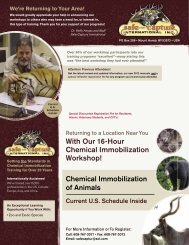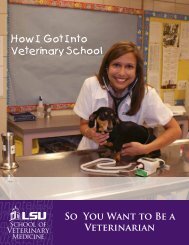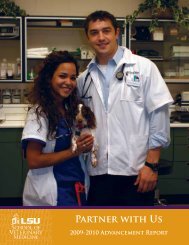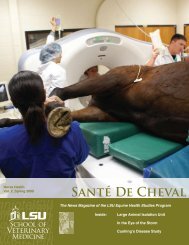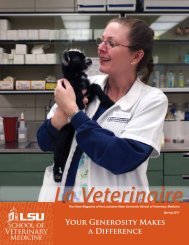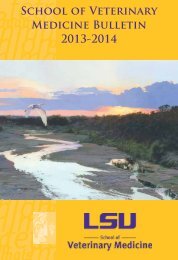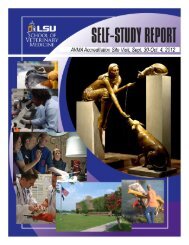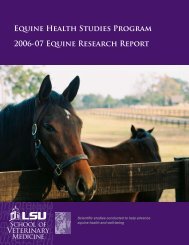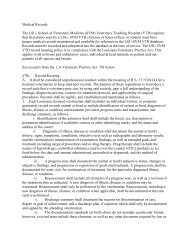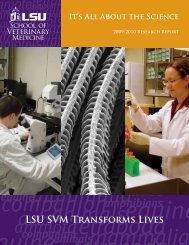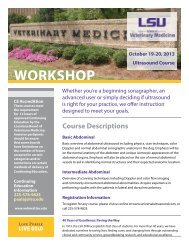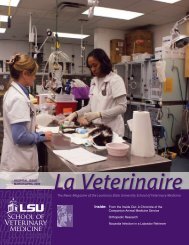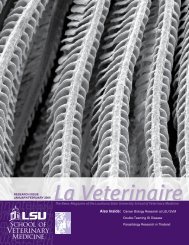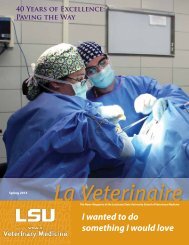Rockin' Round the Clock - School of Veterinary Medicine - Louisiana ...
Rockin' Round the Clock - School of Veterinary Medicine - Louisiana ...
Rockin' Round the Clock - School of Veterinary Medicine - Louisiana ...
You also want an ePaper? Increase the reach of your titles
YUMPU automatically turns print PDFs into web optimized ePapers that Google loves.
and <strong>the</strong> acclimatization to human care and feeding <strong>of</strong>ten<br />
makes return to <strong>the</strong>ir wild environment impossible.<br />
“Winter was calm and relaxed when handled and examined<br />
in <strong>the</strong> water,” said Dr. Kilpatrick. “Although I knew retrieving<br />
her from <strong>the</strong> lagoon and placing her in a captive environment<br />
would likely preclude her ever returning to her native life in<br />
<strong>the</strong> wild, Winter had unintentionally become an orphan and<br />
was completely helpless as a direct result <strong>of</strong> human activities.<br />
In a sense, we owed it to Winter to restore her life as best as<br />
possible, and <strong>the</strong> many unknowns <strong>of</strong> her future would have to<br />
be addressed as <strong>the</strong>y became manifest.”<br />
The rescue and transport <strong>of</strong> Winter to <strong>the</strong> Clearwater<br />
Aquarium was <strong>the</strong> first step in a long and extensive effort to<br />
save her life. Despite round-<strong>the</strong>-clock care, <strong>the</strong> tail fluke and<br />
last two vertebrae deteriorated and eventually separated<br />
from <strong>the</strong> tail. She was unable to propel herself through <strong>the</strong><br />
water with up-and-down motion <strong>of</strong> <strong>the</strong> tail. She moved herself<br />
through <strong>the</strong> water by swinging <strong>the</strong> tail laterally back and<br />
forth like a fish and, although this was effective, a potentially<br />
life-threatening complication <strong>of</strong> this activity in a growing<br />
dolphin is scoliosis. After many arduous trials and failures,<br />
<strong>the</strong> dedicated efforts <strong>of</strong> <strong>the</strong> staff at Clearwater Aquarium<br />
and Hangar Pros<strong>the</strong>tics and Orthotics, Inc. were eventually<br />
able to develop a tail-fluke pros<strong>the</strong>sis for Winter that would<br />
both adhere to her body without irritation and withstand <strong>the</strong><br />
incredible forces <strong>of</strong> propelling a 400-pound dolphin through<br />
<strong>the</strong> water.<br />
“Although <strong>the</strong>re were a few consultations regarding Winter’s<br />
care during <strong>the</strong> first few weeks, <strong>the</strong> remainder <strong>of</strong> her longterm<br />
rehabilitation and recovery were <strong>the</strong> result <strong>of</strong> <strong>the</strong><br />
remarkable volunteers and staff at Clearwater Aquarium and<br />
Hanger Pros<strong>the</strong>tics and Orthotics. After Winter’s tail fluke<br />
was lost to disease, intensive efforts were made to devise a<br />
pros<strong>the</strong>sis that Winter would tolerate, could withstand long<br />
immersion in saltwater, and was <strong>of</strong> great overall durability.<br />
This process was time-consuming and fraught with many<br />
failures and required <strong>the</strong> determined, donated efforts <strong>of</strong><br />
Hanger Pros<strong>the</strong>tics and Orthotics over a sustained period<br />
<strong>of</strong> time. In solving Winter’s pros<strong>the</strong>tic needs, new insights<br />
were gained in <strong>the</strong> field <strong>of</strong> human pros<strong>the</strong>tics. Along <strong>the</strong> way,<br />
Winter has become a source <strong>of</strong> inspiration for individuals with<br />
disabilities <strong>of</strong> all ages and <strong>the</strong> public at large. In giving Winter<br />
<strong>the</strong> benefit <strong>of</strong> <strong>the</strong> doubt, we have helped not only her but<br />
ourselves.”<br />
Dr. Kilpatrick received his DVM from LSU in 1988. He is <strong>the</strong><br />
owner and a practicing veterinarian at Southside <strong>Veterinary</strong><br />
Hospital in Vero Beach, Fla., and an Institutional Animal Care<br />
and Use Committee veterinarian at Torrey Pines Institute for<br />
Molecular Studies in Ft. Pierce, Fla. He sees wildlife cases<br />
weekly and has periodically assisted with marine mammal<br />
strandings and care for 14 years. You can see videotape<br />
footage <strong>of</strong> him and many <strong>of</strong> <strong>the</strong> marine mammal rescuers and<br />
rehabilitators during <strong>the</strong> actual rescue and rehabilitation <strong>of</strong><br />
Winter at <strong>the</strong> end <strong>of</strong> “Dolphin Tale.”<br />
Image: Poster for <strong>the</strong> movie,<br />
“Dolphin Tale.”<br />
Photo: Winter swimming at <strong>the</strong><br />
Clearwater Aquarium in Clearwater,<br />
Fla. Photo provided courtesy <strong>of</strong> <strong>the</strong><br />
Clearwater Aquarium.<br />
Photo: Dr. David Kilpatrick (center)<br />
discusses <strong>the</strong> rescue <strong>of</strong> a pygmy<br />
sperm whale to rescuers and EMS<br />
responders in Ft. Pierce, Fla.<br />
17



